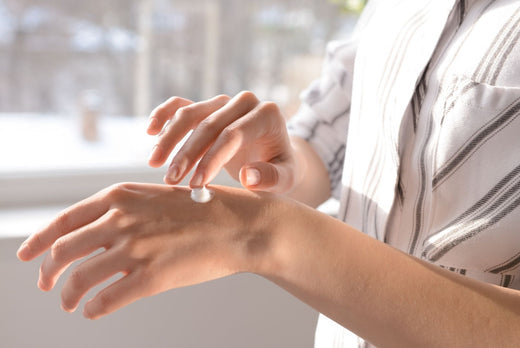

Our skin structure is not at all the same, and it behaves differently according to where it’s located on our body. For example, some of our skin is more exposed to the sun, weather, cleaning products, etc., while other parts are mostly hidden from external forces.
When you consider that not every inch of our skin is treated the same or as visible as other areas, why would you use a body lotion for your hands? Winter is not kind to our hands, and we are not kind to them unintentionally. Instead of reaching for that cheap drugstore lotion to moisturize your hands between glove-wearing and exposure to the elements, let us enlighten you on why you shouldn’t be using body lotion vs hand lotion…
Hand Lotion vs. Body Lotion
Our hands are put through the mill on a daily basis and that shows when you suddenly look down and see dry patches, cracks, and tight, irritated skin. Sadly, our skin is the most abused part of our body and it’s also the least we give attention to (sometimes completely unintentionally). And if we do give some relief to our skin, not every inch of it gets the equal treatment it deserves. Thus, skin care products like hand and body lotions differ not only from one skin type to another but also from the different parts of our bodies—and for good reason.
Hand and body lotions are just some of the many skin care products readily available in the market today. You can see a barrage of skin care products both online and at physical stores all promising healthier skin and amazing ingredients to get the job done. These big brand companies are raking in billions of dollars by convincing people to use this or that product and guarantee supple and younger-looking skin from their lotions, shampoos, and face creams.
While there’s nothing wrong with choosing a major brand and its well-cushioned reputation, you have to realize that to make a profit from such a highly produced product, it’s more difficult for those companies to keep the potency level of their active ingredients in a high range. Subsequently, this equals out to watered-down bottles and a less powerful punch of benefits and results for the consumers (that’s you).
Some people think that using one lotion in lieu of the other is okay, but in reality, a hand lotion may not be suited for your body, and vice versa. Consumers see commercials for a lotion and think that interchanging the two products is okay and apply hand cream in a pinch to another part of their body.
For starters, our hands have remarkably different textures and skin thickness/thinness compared to our legs, arms, stomachs, and back. The palm and balls of the fingers and thumbs have skin that is thick and has a more robust layer to protect from harder or coarse elements. It’s also free from hairs and has no sebaceous glands like our face, arms and legs do. The skin contains lower natural moisturizing factors, possesses a high-density sweat gland and is well padded with tissue. The back of our hands is quite the opposite. It has the presence of few hairs, is thin and the fatty tissue percentage is hardly noticeable.
By observing the difference, it’s pretty safe to say that our hands require different types of nourishment and skin care products than our limbs or face. Yes, lotions for our hands and bodies can provide moisture, protection, and work to combat environmental stressors. The question however is, is the protection provided by body lotion effective when used on our hands?
To answer this, it’s simply the case of knowing what the difference between a hand lotion and a body lotion is. The latter is generally thicker as compared to lotions for the hands and can absorb into pores faster than what it would take if we tried rubbing in this type of lotion into our hands. Yet, it’s usually thinner compared to most face creams available (that is a separate topic and one that everyone should already be aware of: never applying body lotion to your face).
Body lotion is used to trap the moisture that our skin badly needs after being stripped from a variety of nourishment-stripping bad guys, such as:
- Soap
- Fragrances
- Parabens
- Mineral Oil
- Excessive Hand Washing
- Dry Weather
- Extreme Cold
Body lotion can help slow down the process of our body losing water content when we sweat and maintain healthy moisture levels when used on a routine basis. Body lotion is ideally used after bathing to lock in the moisture of the hot water and active ingredients in your body wash or bath oils, bath bombs, etc. and avoid the drying process sucking out that hydration.
Hand lotions are straightforward, and tailor-made specifically for our hands. Nothing else. It’s formulated and created in such a way that it can effectively lock in moisture and oils which are usually stripped due to frequent hand washing and interactions like picking things up or handshaking. Some hand lotions even have antibacterial properties allowing people to protect themselves from germs which can penetrate through cracked skin in the hands. Finally, a key component to note for the difference between hand lotion and body lotion is that the former is not as thick as a body lotion but is far stronger than face lotions.
A True Universal Lotion That Works
To conclude, when it comes to stocking your skin care products, do your research first. Find the best ingredients for your hands and for your body in two individual products. It’s worth it to spend the extra money on both lotions for the best results and long-term vibrancy of your skin! If you want something that’s ultra-hydrating and universal to both body and hand that isn’t considered taboo, shop our Manuka Honey cream and call it a day. Your hands (and the rest of your body) will thank you.


